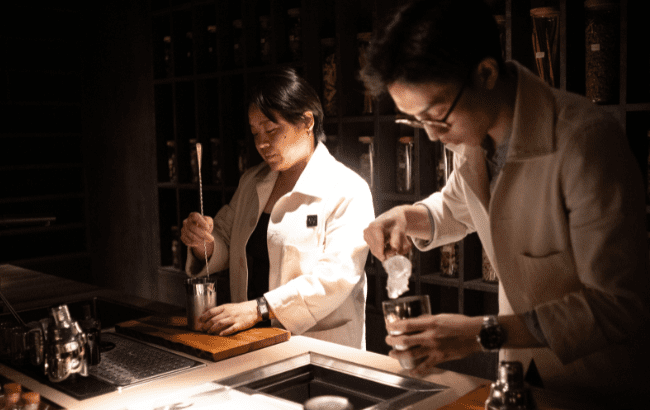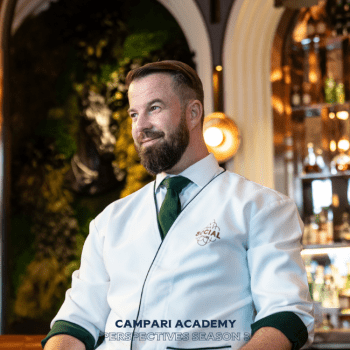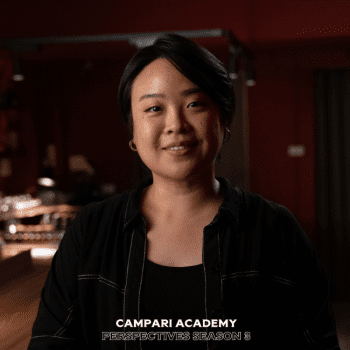Campari Academy kicks off third series
The first episode of the third series of Campari Academy’s Perspectives docuseries focuses on inspiration.

Can creativity be taught, or is it something innate? There are many ways to approach and interpret creativity – and this is the focus topic for the first episode of the latest series of Campari Academy’s Perspectives docuseries.
Each episode of Perspectives is based on one of four themes that lie at the heart of the Campari Academy: design and technology, community and culture, raw materials and flavour, and business and development.
Unlocking Creativity is the first of three episodes that will comprise season three of Perspectives, and falls under the ‘business and development’ theme. Available to view online from April via campariacademy.com, the episode brings a wealth of talent – within and outside of the drinks trade – to share their views on being creative. The exploration dives deeper than simply the generation of ideas, but taps into how to execute the vision, sharing skills and knowledge.
Episode one focuses on four people: Alexis Belton, beverage director, Metropolis by Marcus Samuelsson, New York City; Brian Buirge, creative director, Good Fucking Design Advice (GFDA), New York City; Taln Rojanavanich, co‐owner, Messenger Service Bar, and Bar Us, Bangkok; and Philip Bischoff, beverage manager, Four Seasons Bangkok.

The opening episode begins with Buirge, who shares how GFDA contributes to fostering creative cultures in businesses, and stresses the need for growth and challenging ourselves. He also highlights how it’s important to hire people whose skills may surpass your own, and to nurture their talent.
“It’s important to step outside of your comfort zone,” Buirge says. “That goes for new professionals and seasoned practitioners. For experts, it can be detrimental to fall back on what they know, it stagnates creativity and what made them brilliant in the first place.”
Sources of inspiration
Cross‐category influence is also encouraged – exploring sources of inspiration from outside of the beverage world. It’s something that comes naturally to Rojanavanich, whose background lies in product and interior design.
“My partner and I were doing interior design together, and we wanted to design our own space, so we said let’s do a small hostel,” she explains. “Backpackers came to our place and started asking about the beverages, cocktails, coffee, beer, wine, so it made us learn about drinks. That’s how we practised making cocktails; someone might say: ‘Hey, can you make me a Daiquiri?’ We wouldn’t really know how, but we would go and buy the ingredients, make the cocktail and serve them, learning along the way.”
Local food flavours and markets have been a key source of creative inspiration for Rojanavanich, who now co‐owns two bars in Bangkok. “After making classic cocktails, we tried to dig deeper into the cocktail,” Rojanavanich explains. “What happens if we replace this flavour with this ingredient? Could we add a new flavour to combine with the existing flavours? From our interior design background, we fell in love with liquid design. It was another means of designing, but we replaced designing the space with designing flavour instead.”
Bischoff brings the discussion to the importance of setting a foundation. Getting the basics right before moving to the next step of creativity is imperative for success at the Four Seasons, he says.

For Belton, the logistics that go into running a bar are just as important as the creativity poured into drinks. “My side of the conversation is primarily talking about the logistical side, or the side that isn’t as ‘glamorous’,” Belton explains. “How do you foster creativity? And what do you do when creativity doesn’t always come naturally? I have to put myself in spaces where I can have creative flow.”
Buirge also mentions this, and encourages people – particularly beginners – to “fail a lot, fail early and often. That’s important for everybody, but often, I tend to look at failure as the conclusion, providing you with more information. If you zoom in on the failure, large parts of what you want to create didn’t work. But maybe there’s an inkling of something that does work. If you don’t look at failure, or something that didn’t work, you’re missing an opportunity for the learning that can come from that.”
For Rojanavanich, taking it back to basics is an important tool to reset when stuck in a creative rut. “If you eat fine‐dining cuisine every day, it’s too much; you’d want your everyday street food or mum’s cooked meal,” she shares as an analogy. “For me, pull back and relax, and the idea will come in the next stage; don’t force it too much.”
Passion is the message
I ask Rojanavanich what the key takeaway message is from the first episode, to which she answers: “Be passionate. Don’t be afraid to try something new.” Belton adds: “Creativity comes in many forms. We can be inspired by the different people around us in how we approach creativity. There’s a really big world out there, and a lot of people doing very cool things.”
Last year, Campari Academy opened its first state-of-the-art education hub in the UK.
Related news
Sastrería Martínez unveils new cocktail menu
